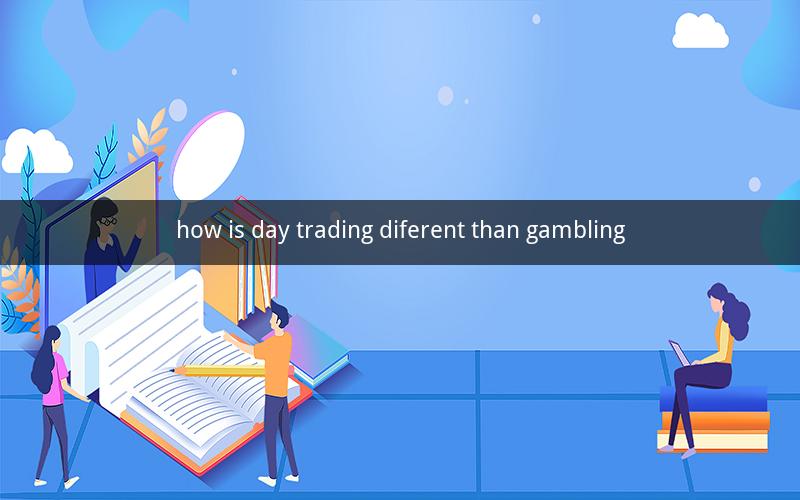
Understanding the Differences Between Day Trading and Gambling
Table of Contents
1. Introduction to Day Trading
2. Introduction to Gambling
3. Risk Management
4. Skill and Knowledge
5. Time Commitment
6. Legal and Ethical Considerations
7. Market Dynamics and Information
8. Financial Goals
9. Mental Approach
10. Conclusion
1. Introduction to Day Trading
Day trading is the practice of buying and selling financial instruments within the same trading day. This activity is often conducted by individuals who use various financial instruments such as stocks, bonds, options, and futures. The goal is to profit from short-term price fluctuations in the markets.
2. Introduction to Gambling
Gambling, on the other hand, is the act of betting money or something of value on an event with an uncertain outcome, with the primary intent of winning additional money or material goods. Common forms of gambling include sports betting, lottery, casino games, and poker.
3. Risk Management
In day trading, risk management is a crucial aspect. Traders use various strategies to mitigate risk, such as setting stop-loss orders to limit potential losses and employing diversification to spread their investments across different assets. In gambling, risk management is often overlooked, as the focus is typically on the potential for winning large sums of money.
4. Skill and Knowledge
Day trading requires a significant amount of skill and knowledge about the markets, financial instruments, and economic indicators. Traders must be able to analyze market trends, understand financial statements, and make informed decisions based on their research. Gamblers, while they may have some knowledge about the game they are playing, do not necessarily require the same level of expertise.
5. Time Commitment
Day traders typically spend a substantial amount of time analyzing the markets and executing trades. This can range from a few hours a day to several hours a week. Gamblers, on the other hand, may spend varying amounts of time on their activities, depending on the type of gambling involved.
6. Legal and Ethical Considerations
Day trading is a regulated activity that requires traders to comply with various legal and ethical standards. This includes registering with the appropriate regulatory bodies, adhering to anti-money laundering laws, and maintaining a high standard of integrity in their trading practices.Gambling, while regulated in many places, often lacks the same level of oversight and can be subject to legal and ethical issues, such as underage gambling and addiction.
7. Market Dynamics and Information
Day traders rely heavily on real-time market data and analysis to make their trading decisions. They often use technical and fundamental analysis to predict market movements. Gamblers, while they may also use some form of analysis, are typically more focused on the specific event they are betting on, rather than the broader market dynamics.
8. Financial Goals
The primary goal of day trading is to generate consistent, predictable returns over time. Traders often aim for long-term profitability and may use a combination of short-term and long-term strategies. In gambling, the primary goal is to win money, often in a short period of time, with the focus being on the potential for large, immediate payouts.
9. Mental Approach
Day trading requires a disciplined and disciplined mental approach. Traders must be able to stay calm and make rational decisions, even when faced with potential losses or significant market volatility. Gamblers may experience a more emotional and impulsive approach to their activities, which can lead to poor decision-making and financial loss.
10. Conclusion
In conclusion, while there may be some superficial similarities between day trading and gambling, the fundamental differences are clear. Day trading is a skill-based activity that requires knowledge, discipline, and risk management, while gambling is often a form of entertainment with a higher risk of financial loss. Understanding these differences can help individuals make more informed decisions about their financial activities.
---
Questions and Answers
1. Q: What is the primary difference between day trading and gambling?
A: The primary difference is the intention behind the activity. Day trading is an investment strategy focused on generating returns, while gambling is typically a form of entertainment with the hope of winning money.
2. Q: Can someone make a living by day trading?
A: Yes, it is possible to make a living by day trading, but it requires a high level of skill, discipline, and risk management.
3. Q: Is day trading legal in all countries?
A: No, day trading is subject to regulatory requirements in different countries. It is important for traders to understand the legal landscape in their jurisdiction.
4. Q: How does risk management differ in day trading versus gambling?
A: Day trading involves setting stop-loss orders and diversifying investments to mitigate risk. Gamblers often have little to no risk management in place.
5. Q: Can a day trader be considered a gambler?
A: While both involve betting on outcomes, a day trader is typically not considered a gambler due to the skill, discipline, and strategic nature of their activities.
6. Q: Is it possible to be successful at day trading without any experience?
A: It is possible, but very difficult. Experience and knowledge of the markets are crucial for making informed decisions.
7. Q: What is the most important skill for a day trader?
A: The most important skill is the ability to analyze market trends and make rational decisions based on that analysis.
8. Q: Can gambling lead to financial independence?
A: While it is possible, the likelihood is low, and the risk of significant financial loss is high.
9. Q: Is there a psychological difference between day trading and gambling?
A: Yes, day trading requires discipline and emotional control, while gambling can be more impulsive and emotionally driven.
10. Q: Can someone transition from gambling to day trading?
A: It is possible, but it requires a significant shift in mindset, discipline, and dedication to learning and understanding the markets.